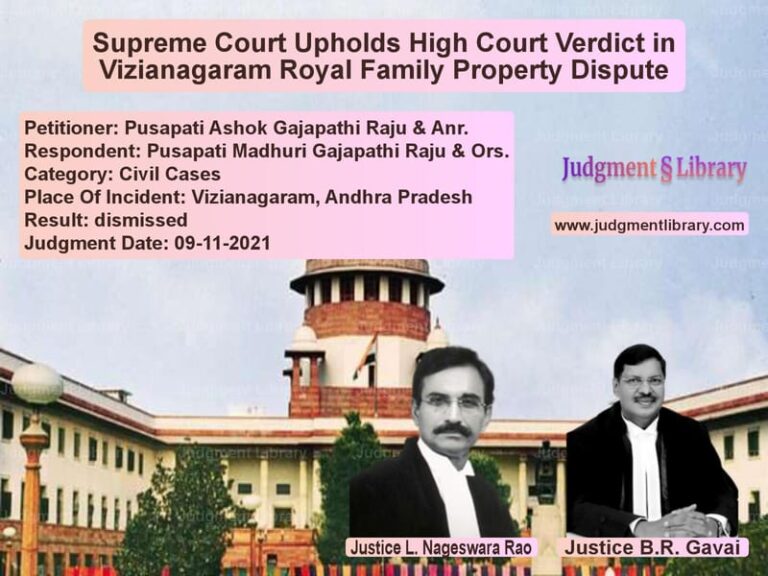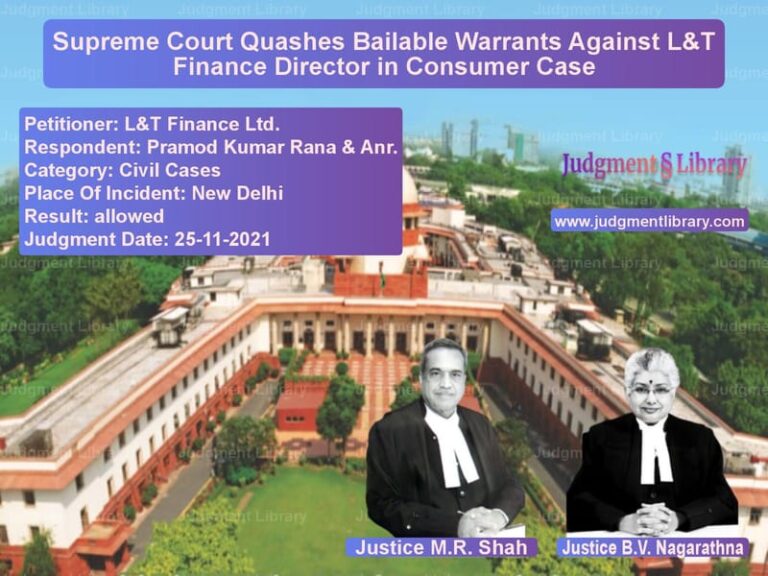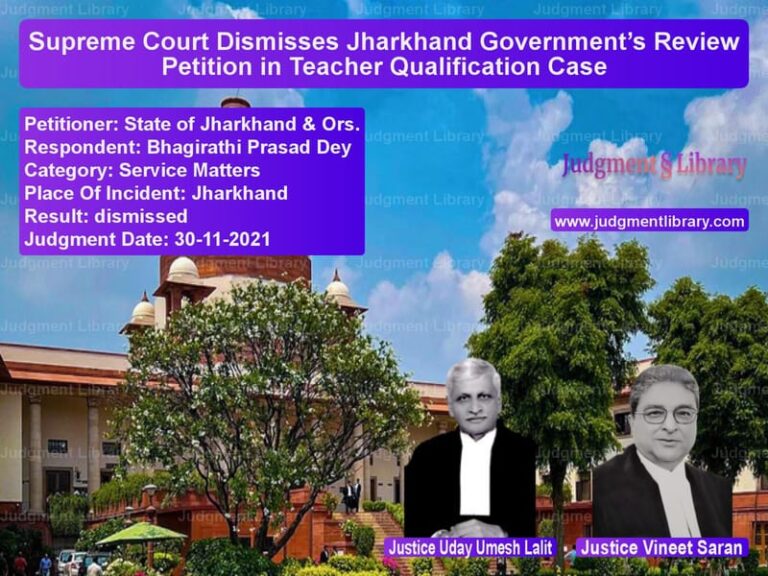Dowry Harassment and Sentencing: Supreme Court’s Landmark Ruling in Jharkhand Case
The case of Samaul Sk. vs. The State of Jharkhand & Anr. is a crucial ruling that addresses dowry harassment and the application of sentencing principles under Indian criminal jurisprudence. The Supreme Court had to decide whether the sentence of three years’ imprisonment awarded to the appellant could be reduced, given his willingness to compensate the victim.
The appeal arose from a criminal revision petition challenging the decisions of the lower courts, which had convicted the appellant under Section 498A of the Indian Penal Code (IPC) for subjecting his wife to cruelty and harassment over dowry demands.
Background of the Case
The case involved allegations of dowry harassment by the appellant, Samaul Sk., against his wife, Hena Bibi. Key facts of the case include:
- The marriage between the appellant and respondent no.2 (Hena Bibi) was solemnized on February 8, 2000, under Muslim customs.
- The appellant had an existing marriage with one Mastra Bibi, which raised questions about the legality of the second marriage.
- The couple lived together for about a year and a half, and two children were born from the marriage.
- Hena Bibi alleged that due to the instigation of the appellant’s first wife, she faced physical and mental torture and was ultimately forced to leave her matrimonial home.
- A complaint was filed under Section 498A IPC, leading to criminal proceedings against the appellant.
Petitioner’s Arguments
The appellant, Samaul Sk., contended that:
- His conviction was based on an exaggerated and biased complaint by his wife.
- The evidence presented against him was insufficient to warrant a harsh sentence of three years’ rigorous imprisonment.
- He was willing to pay compensation of Rs.3 lakhs to his wife and children, apart from existing maintenance under Section 125 of the Criminal Procedure Code (CrPC).
- Given his willingness to compensate, his sentence should be reduced.
Respondent’s Arguments
On the other hand, the State of Jharkhand and Hena Bibi argued:
- The conviction under Section 498A IPC was fully justified based on the available evidence.
- The allegations of physical and mental torture were corroborated by witness testimonies.
- Dowry harassment cases must be treated with strictness to deter future offenses.
- The appellant’s offer to compensate could not absolve him of criminal liability.
Key Legal Considerations
The Supreme Court examined the case on the following legal aspects:
1. Sentencing and Compensation
The Court deliberated on the purpose of sentencing in criminal cases. It emphasized that criminal justice serves both retributive and reformative purposes. The Court cited Section 357 CrPC, which allows fines to be directed as compensation to the victim.
2. Applicability of the Probation of Offenders Act, 1958
The appellant initially sought relief under the Probation of Offenders Act, 1958, which allows courts to release certain convicts on probation instead of sentencing them. However, the Court declined to grant this benefit due to the gravity of the offense.
3. Reduction of Sentence
The Court considered the appellant’s conduct and willingness to compensate the victim. It noted that ensuring the well-being of the victim and her children was paramount and thus inclined towards reducing the sentence while ensuring that compensation was paid.
Court’s Observations
The Supreme Court made several significant observations:
“The object of any criminal jurisprudence is reformative in character and to take care of the victim. It is towards this objective that Section 357 of the Code of Criminal Procedure is enacted in the statute.”
Regarding sentencing, the Court stated:
“Keeping in mind the nature of the offense, we had declined the benefit of the Probation of Offenders Act to the appellant. However, if the petitioner/appellant is showing remorse and is willing to make arrangements for respondent No.2 and his two children born out of the wedlock, we would not like to come in the way of such an arrangement.”
Final Verdict
The Supreme Court modified the sentence as follows:
- The appellant’s sentence of three years’ rigorous imprisonment was reduced to the period already undergone.
- The appellant was directed to deposit Rs.3 lakhs with the trial court by February 28, 2022.
- Out of this amount, Rs.2 lakhs would be given to respondent no.2 (Hena Bibi).
- The remaining Rs.1 lakh would be split into Rs.50,000 fixed deposits in a nationalized bank for each of the children, to be released when they turn 21.
- If the appellant failed to deposit the amount, he would have to serve the remaining three-year sentence.
The Court concluded:
“We, however, make it clear that if the amounts are not deposited, the appellant will have to undergo the remaining part of the sentence of 3 years.”
Implications of the Judgment
This ruling has significant implications for cases involving dowry harassment and sentencing:
- Victim-Centric Approach: The judgment prioritizes victim compensation while balancing punishment for the offender.
- Encouragement of Reformative Justice: The Court’s emphasis on compensation aligns with a shift towards reformative justice principles.
- Enforcement of Maintenance: The case reinforces that financial support for victims and children must be secured.
- Stringent Sentencing in Dowry Cases: The rejection of probation for the appellant signifies a strict stance against dowry-related offenses.
Overall, the ruling ensures that the offender is held accountable while providing meaningful relief to the victim and her children.
Petitioner Name: Samaul Sk..Respondent Name: The State of Jharkhand & Anr..Judgment By: Justice Sanjay Kishan Kaul, Justice Hrishikesh Roy.Place Of Incident: Pakur, Jharkhand.Judgment Date: 31-08-2021.
Don’t miss out on the full details! Download the complete judgment in PDF format below and gain valuable insights instantly!
Download Judgment: samaul-sk.-vs-the-state-of-jharkha-supreme-court-of-india-judgment-dated-31-08-2021.pdf
Directly Download Judgment: Directly download this Judgment
See all petitions in Domestic Violence
See all petitions in Alimony and Maintenance
See all petitions in Bail and Anticipatory Bail
See all petitions in SC/ST Act Case
See all petitions in Dowry Cases
See all petitions in Judgment by Sanjay Kishan Kaul
See all petitions in Judgment by Hrishikesh Roy
See all petitions in partially allowed
See all petitions in Modified
See all petitions in supreme court of India judgments August 2021
See all petitions in 2021 judgments
See all posts in Criminal Cases Category
See all allowed petitions in Criminal Cases Category
See all Dismissed petitions in Criminal Cases Category
See all partially allowed petitions in Criminal Cases Category







